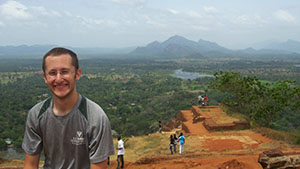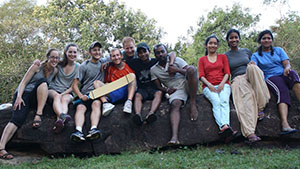Aaron Levin - Sri Lanka



This summer, thanks to Students Training in Advanced Research (STAR) and the International Summer Externship Funding programs, I had the opportunity to travel to Sri Lanka. I was based at the University of Peradeniya, home of the only veterinary school in Sri Lanka. In conjunction with Dr. Woutrina Smith of the UC Davis SVM and Dr. Ruchika Fernando of the University of Peradeniya Faculty of Veterinary Medicine and Animal Science, I conducted a research project entitled “Diseases with Zoonotic Potential of Wild Toque Macaques (Macaca sinica) in Sri Lanka”. My research involved the capture of wild macaques, sample collection, and a variety of diagnostic techniques to detect enteroparasites, dengue virus, and tuberculosis. While there were many struggles associated with conducting a research project in a developing country, my Sri Lankan mentor and I worked together to solve the problems we faced.
In addition to my research, I participated in the One Health Intensive Field Course, operated by UC Davis and the University of Peradeniya. For four weeks, we traveled around Sri Lanka visiting various sites of cultural, scientific, and conservational importance. Through discussions with our Sri Lankan colleagues and local people, we learned about the challenges unique to a developing country such as Sri Lanka, as well as challenges that are global in scope. Topics of discussion included Chronic Kidney Disease of Unknown Etiology, sustainable agriculture, the impacts of cultural beliefs on animal welfare, human-wildlife conflict, and social equality issues. While some of these problems are unique to Sri Lanka, we face many similar problems in the United States.
As an aspiring zoo veterinarian with an interest in One Health, I was most fascinated by the human-wildlife conflict in Sri Lanka. Due to its rich biodiversity, there are many endangered species in Sri Lanka. However, some of these same species, like elephants and macaques, are the ones most in conflict with humans. Through the Field Course and my research, I had the opportunity to talk to many people, both Sri Lankan and American, to learn more about this multi-faceted problem. Upon returning to the United States this fall, I had the opportunity to present at the One Health Symposium here at UC Davis with Drs. Woutrina Smith (UCD SVM), Michael Wilkes (UCD SOM), and Eranda Rajapaksha (University of Peradeniya Faculty of Veterinary Medicine and Animal Science) on Human-Wildlife Conflict. I would like to thank the STAR program and the International Externship Funding program for making my research, participation in the field course, and travel possible.
